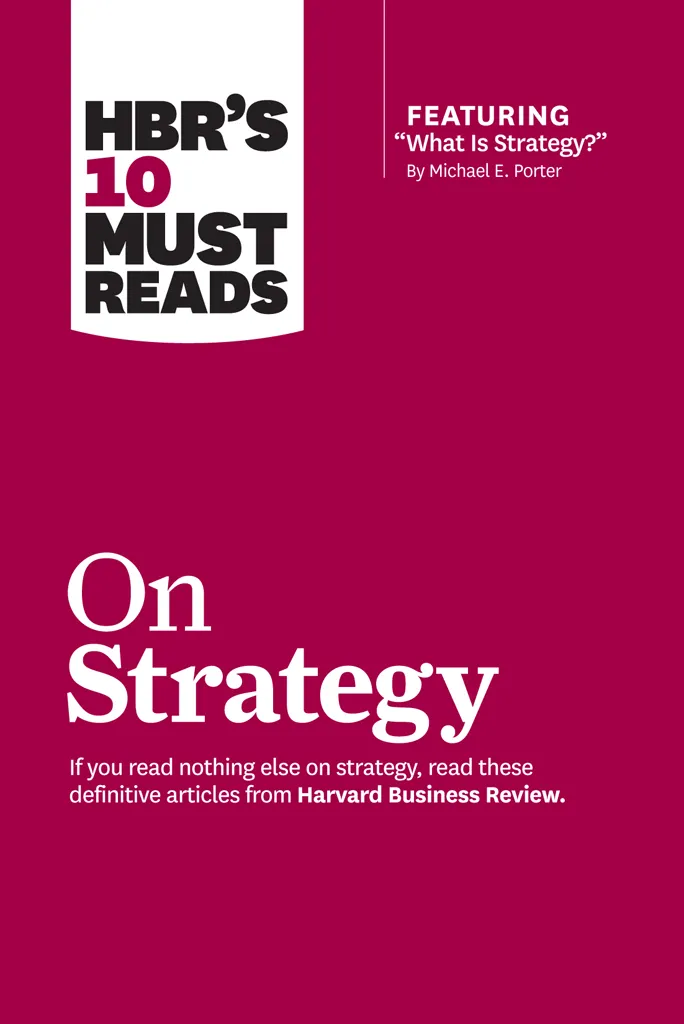![]()
![]()
On
Strategy
HARVARD BUSINESS REVIEW PRESS
Boston, Massachusetts
![]()
Find more digital content or join the discussion on www.hbr.org.
The web addresses referenced and linked in this book were live and correct at the time of the book’s publication but may be subject to change.
Copyright 2011 Harvard Business School Publishing Corporation
All rights reserved
No part of this publication may be reproduced, stored in or introduced into a retrieval system, or transmitted, in any form, or by any means (electronic, mechanical, photocopying, recording, or otherwise), without the prior permission of the publisher. Requests for permission should be directed to
[email protected], or mailed to Permissions, Harvard Business School Publishing, 60 Harvard Way, Boston, Massachusetts 02163.
Library of Congress Cataloging-in-Publication Data
HBR’s 10 must reads on strategy.
p. cm.
Includes index.
ISBN 978-1-4221-5798-5 (pbk. : alk. paper) 1. Strategic planning. I. Harvard business review. II. Title: HBR’s ten must reads on strategy. III. Title: Harvard business review’s 10 must reads on strategy.
HD30.28.H395 2010
658.4'012—dc22
2010031619
![]()
Contents
Copyright
What Is Strategy?
by Michael E. Porter
The Five Competitive Forces That Shape Strategy
by Michael E. Porter
Building Your Company’s Vision
by James C. Collins and Jerry I. Porras
Reinventing Your Business Model
by Mark W. Johnson, Clayton M. Christensen, and Henning Kagermann
Blue Ocean Strategy
by W. Chan Kim and Renée Mauborgne
The Secrets to Successful Strategy Execution
by Gary L. Neilson, Karla L. Martin, and Elizabeth Powers
Using the Balanced Scorecard as a Strategic Management System
by Robert S. Kaplan and David P. Norton
Transforming Corner-Office Strategy into Frontline Action
by Orit Gadiesh and James L. Gilbert
Turning Great Strategy into Great Performance
by Michael C. Mankins and Richard Steele
Who Has the D? How Clear Decision Roles Enhance Organizational Performance
by Paul Rogers and Marcia Blenko
About the Contributors
Index
![]()
What Is Strategy?
by Michael E. Porter
I. Operational Effectiveness Is Not Strategy
For almost two decades, managers have been learning to play by a new set of rules. Companies must be flexible to respond rapidly to competitive and market changes. They must benchmark continuously to achieve best practice. They must outsource aggressively to gain efficiencies. And they must nurture a few core competencies in race to stay ahead of rivals.
Positioning—once the heart of strategy—is rejected as too static for today’s dynamic markets and changing technologies. According to the new dogma, rivals can quickly copy any market position, and competitive advantage is, at best, temporary.
But those beliefs are dangerous half-truths, and they are leading more and more companies down the path of mutually destructive competition. True, some barriers to competition are falling as regulation eases and markets become global. True, companies have properly invested energy in becoming leaner and more nimble. In many industries, however, what some call hypercompetition is a self-inflicted wound, not the inevitable outcome of a changing paradigm of competition.
The root of the problem is the failure to distinguish between operational effectiveness and strategy. The quest for productivity, quality, and speed has spawned a remarkable number of management tools and techniques: total quality management, benchmarking, time-based competition, outsourcing, partnering, reengineering, change management. Although the resulting operational improvements have often been dramatic, many companies have been frustrated by their inability to translate those gains into sustainable profitability. And bit by bit, almost imperceptibly, management tools have taken the place of strategy. As managers push to improve on all fronts, they move farther away from viable competitive positions.
Operational effectiveness: necessary but not sufficient
Operational effectiveness and strategy are both essential to superior performance, which, after all, is the primary goal of any enterprise. But they work in very different ways.
A company can outperform rivals only if it can establish a difference that it can preserve. It must deliver greater value to customers or create comparable value at a lower cost, or do both. The arithmetic of superior profitability then follows: delivering greater value allows a company to charge higher average unit prices; greater efficiency results in lower average unit costs.
Ultimately, all differences between companies in cost or price derive from the hundreds of activities required to create, produce, sell, and deliver their products or services, such as calling on customers, assembling final products, and training employees. Cost is generated by performing activities, and cost advantage arises from performing particular activities more efficiently than competitors. Similarly, differentiation arises from both the choice of activities and how they are performed. Activities, then, are the basic units of competitive advantage. Overall advantage or disadvantage results from all a company’s activities, not only a few.1
Operational effectiveness (OE) means performing similar activities better than rivals perform them. Operational effectiveness includes but is not limited to efficiency. It refers to any number of practices that allow a company to better utilize its inputs by, for example, reducing defects in products or developing better products faster. In contrast, strategic positioning means performing different activities from rivals’ or performing similar activities in different ways.
Differences in operational effectiveness among companies are pervasive. Some companies are able to get more out of their inputs than others because they eliminate wasted effort, employ more advanced technology, motivate employees better, or have greater insight into managing particular activities or sets of activities. Such differences in operational effectiveness are an important source of differences in profitability among competitors because they directly affect relative cost positions and levels of differentiation.
Differences in operational effectiveness were at the heart of the Japanese challenge to Western companies in the 1980s. The Japanese were so far ahead of rivals in operational effectiveness that they could offer lower cost and superior quality at the same time. It is worth dwelling on this point, because so much recent thinking about competition depends on it. Imagine for a moment a prod...


